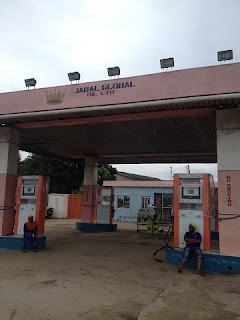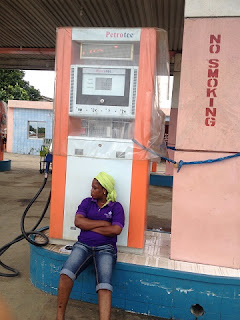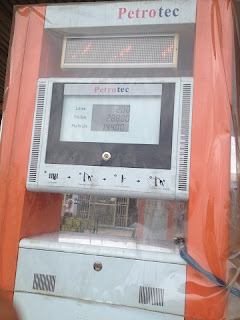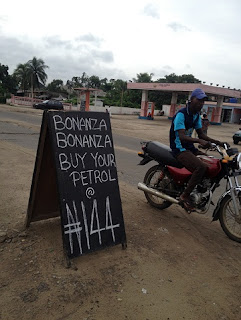The prediction that there would be high competition among marketers and fuel stations when the fuel subsidy was removed by the Federal Government may have begun to come to pass as a fuel station in Badagry, Lagos state currently on petrol sale promotion of N144 per litre against the general N145 per litre.
A senior officer of the fuel station, Jabal Global Oil, Badagry, who preferred anonymity said they are actually on bonanza sale of N144 per liter.
Another staff, suspected to be the supervisor of the station also confirmed the bonanza sale and further said he learnt a station is currently selling petrol at N143 per litre.
At the station, the sale representatives were seen even dozing off as very few motorists go in and out to buy the products without any hitch.
The pump meters at the station have been adjusted to N144 per litre.
Dr Ibe Kachikwu, the Minister of State for Petroleum, who also doubles as the Group Managing Director of Nigeria National Petroleum Corporation, NNPC has earlier assured Nigerians that pump price of premium motor spirit (PMS) otherwise called petrol, will fall drastically in the next six months.
 |
| The Filling Station |
During the interview, Kachikwu said; "if you do a price review after six months, you will be amazed at how low the price would have become. We expect the prices to go down because we have provided an opportunity for people to take advantage of government liberalisation policy of the downstream sector and eliminate inefficiencies and losses."
When asked about the reason for the government to have fixed the pump price of petrol in a deregulated market, he explained that "the intention of the government was to achieve what was achieved in diesel by allowing everybody to be able to bring in products and promote competition."
"However, we want to make sure that at the initial stage marketers do not take undue advantage of the situation. That's why we said nobody should sell above N145 per litre.
 |
| An Attendant of the Station relaxing due to slow pace of sales |
 |
| The Pump meter displaying N144 per litre sale price |
"If you look at consumption of diesel, it is not as competitive as petrol. What we have done is an upper cap, but we have not told them what price to sell. We expect that efficiency and market forces will determine their pieces.
"You know we have a price band of N135 to N145 per litre, but reality is that those are guideline prices," he said.
Furthermore, he stated that other factors that may affect pricing include sources of foreign exchange, level of efficiency and how much a marketer is investing in logistics like storage and distribution.
When asked if the government has put measures in place to check marketers who may want to sell at above price cap of N145 per litre, he stated that he expects competition to bridge the gaps and eliminate abnormal profit.
Furthermore, he stated that "the difference you saw during the previous price regime of N87 per litre is just what we are trying to address because of arbitrage."
"The individuals that bought NNPC products and sell at other prices will now start buying their own products and sell on their own. Even NNPC retail stations will sell at competitive prices.
"Within six months, you will be seeing differentials of N1 to N2 per litre but as you go into interlands, NNPC will tend to be selling at between N120 to N130 per litre.
"Refineries will also become competitive. Refineries have not worked efficiently in the past because petroleum products are largely subsidized. Nobody wants to invest in refineries and at the end of the day, the government bears the brunt.
"We will sell the little a produce which is less than 10million per day and we will well at competitive prices," he said.

No comments